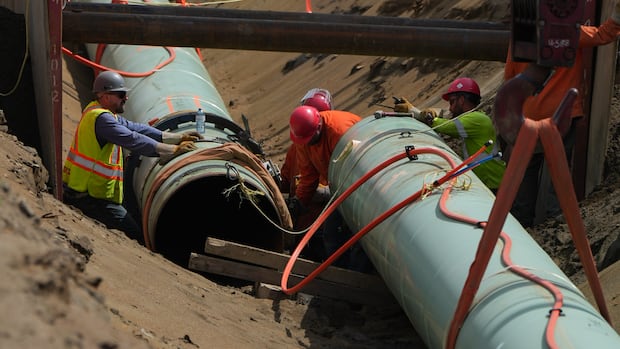The CEO of Canada’s newly formed Major Projects Office (MPO) says she hopes that it would take between four and five months to issue a decision on a bitumen pipeline to the West Coast.
Dawn Farrell, the CEO of the MPO, appeared before the environment committee Thursday to answer questions about Canada’s emissions reduction plans.
Conservative MP David Bexte asked her how long, once Alberta’s pitch lands on her desk, it would take her office to determine if it meets the criteria to be designated a project of national interest.
“I can’t answer that with any credibility,” she said. “My aspiration would be four to five months.”
Conservative Leader Pierre Poilievre said Farrell’s aspirational timeline was too long and that it should be approved immediately.
Conservative Leader Pierre Poilievre says Thursday that the Keystone XL oil pipeline would be good for both Canada and the U.S. — but that he wants pipelines running west, east and north, too.
“The federal government and Mark Carney need to do only one thing to make it happen — get out of the way,” Poilievre said. “If … they grant a permit, there will be billions of dollars of private money that will rush in and build this pipeline.”
Prime Minister Mark Carney created the MPO to act as a single point of contact for proponents of major projects, promising the office will help get major projects approved and built faster.
Examples of such projects include highways, railways, ports, airports, pipelines, critical minerals, mines, nuclear facilities and electrical transmission projects.
Provinces, territories, Indigenous communities, municipalities and other proponents such as private corporations or consortiums can submit proposals to the MPO. The office then looks at the projects and determines if they meet the criteria.
What qualifies?
Submitted projects are also measured against five key benchmarks to determine if they will:
- Strengthen Canada’s autonomy, resilience and security.
- Provide national economic or other benefits.
- Have a high likelihood of being successful.
- Advance the interests of Indigenous Peoples.
- Contribute to Canada’s objectives with respect to climate change.
The five benchmarks are not a checklist, but rather factors that are considered when evaluating whether a project is nation-building or not.
Once the MPO determines a project qualifies, it makes a recommendation to the minister responsible. After some consultation, the project is added to Schedule One of the Building Canada Act, designating it a project of national interest.
The new system is intended to reduce the approval time down to two years.
Alberta and a new pipeline
Alberta Premier Danielle Smith announced earlier this month that she plans to develop and submit a formal application.
Smith said the province will be the proponent for the application because private industry isn’t yet ready to commit the necessary capital given existing federal regulations, in particular the restrictions implemented in 2019 on oil tankers in B.C.’s northern waters.
In the meantime, Alberta is committing $14 million to the proposal and leading a “technical advisory group” that includes three major pipeline companies — Enbridge, South Bow and Trans Mountain — although those companies would not necessarily be involved if the project were to proceed.
No specific route has been proposed; identifying potential routes will be part of the work the province plans to undertake.
Smith’s actions have prompted a stern response from B.C. Premier David Eby who has said that pitching a pipeline before a proponent has been found threatens community support and social licence that would allow other major projects along the provincial coast to move forward.
If there is to be a conversation, Eby says it should be about a “real project,” not one that hasn’t secured a proponent, funding or environmental assessment approval.
Poilievre pointed out that the approval for such a pipeline is wholly within the jurisdiction of the federal government and Eby is “well worth ignoring.”







